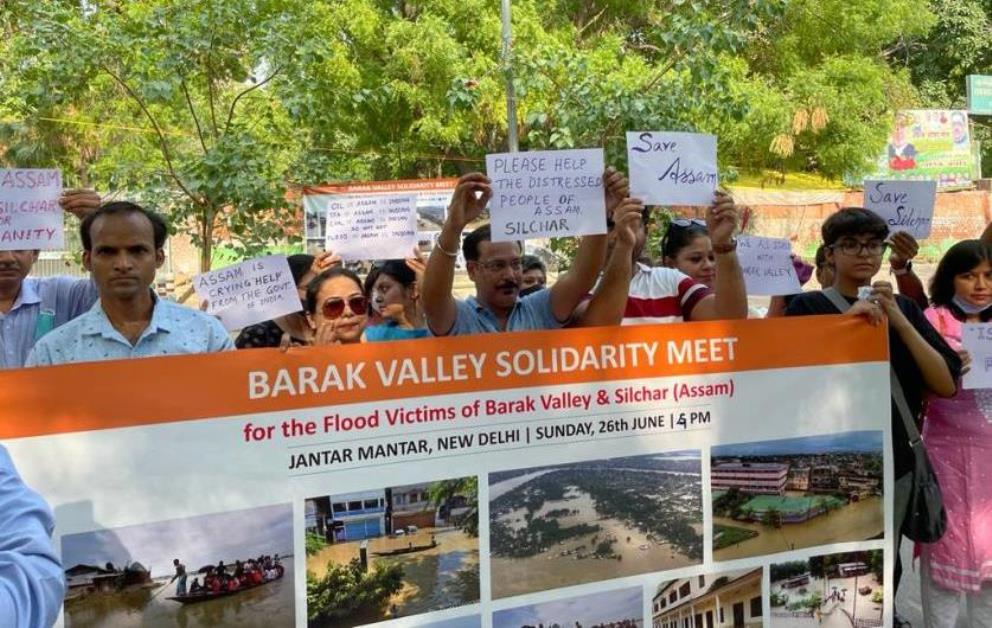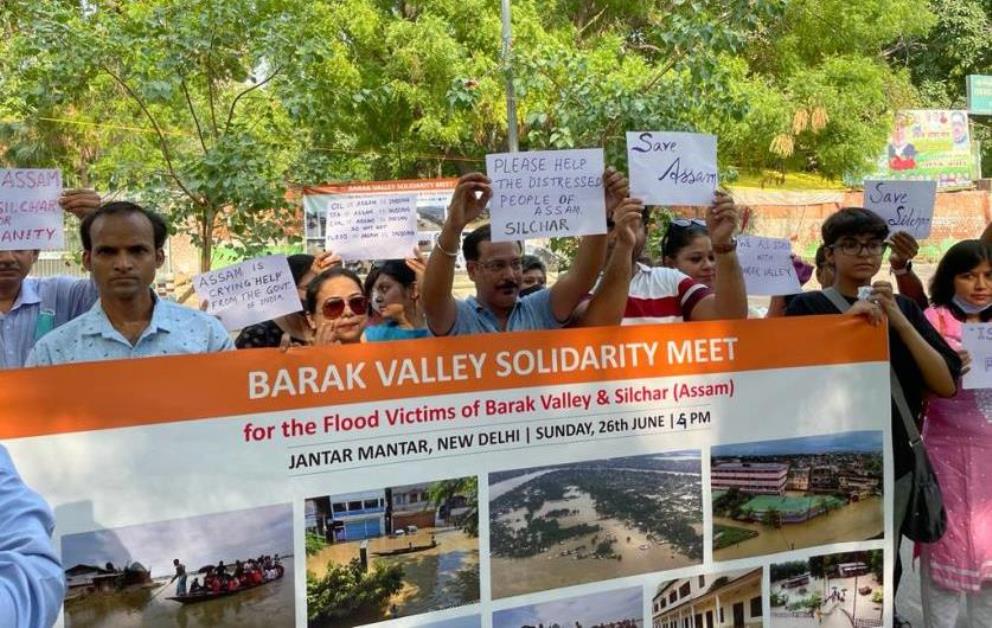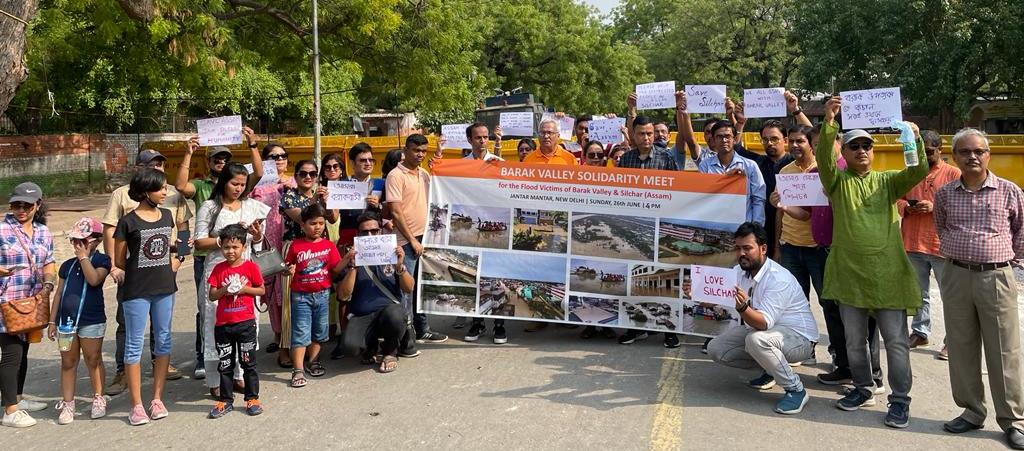We feel that is the biggest systemic failure in recent history and should be thoroughly investigated
 KRC TIMES Desk
KRC TIMES Desk

Delhi saw a gathering of citizens from all across Barak Valley in Jantar Mantar, New Delhi, at 4 PM on 26th June for expressing solidarity with the flood victims in and around Silchar. There were about 150 residents and this has been touted as a historical event as it was the first time that so many people had gathered in Delhi and NCR region in support of the people of Barak Valley.
The event organized by an informal group called ‘The Barak Thinkers’. It was coordinated by Asim Chowdhury, Joydeep Samaddar, Suman Baishnab, Madhumita Baishnab, and Aparna Chowdhury. The meeting began with a small solidarity march behind Jantar Mantar and was followed by a Facebook live that was opened by Asim Chowdhury and Madhumita Baishnab and also joined by other members of the team. The session’s also included the sharing of the individual opinions of participants who expressed their thoughts. The organizers and participants freely expressed their opinion and these were primarily centered on the unbearable pain that the residents of Silchar were going through.

In a presser released to the media, the suggestions ranged from increasing the participation of local youth to added focus on meeting the basic needs of water, food, medicines, and electricity. The case of floating dead bodies and the dacoits who were scaring people across Silchar was also highlighted. The live session included the sharing of individual experiences. The meeting was summed up by Joydeep Samaddar, on behalf of the non-residents of Barak Valley, who emphasized the need to focus on future post-flood situations. He also spoke about the need to train doctors and nurses so that they can handle a post-flood health situation. He also expressed his concern about the increasing shortage of sanitary pads for women and the need to bring about phenyl, Dettol, disinfectants, etc. so that a health crisis does not arise.
The meeting dispersed with a commitment by all those who were present about their unfettered support to the cause of Barak Valley. The love and feelings expressed by the members were touching, to say the least. It was surprising to see that the meet had many participants who had left Barak Valley long back but their hearts still wept for the Barak Valley region. The warmth and bonhomie expressed in the meeting were extraordinary.
To get a background of the meet, for more than a week Silchar is witnessing the biggest catastrophe in its history. Almost 90% of the urban areas have flooded amidst countless cries for water, food, and medicines. About 4 million people are stuck in the flood that is considered the worst ever in this valley.
The situation has deteriorated every passing day and it’s about 6 days that the water level in Silchar still remains high and has stranded residents. The local administration has put up rescue teams but they are inadequate given the scale of the disaster.
Initially, the relief operations were limited but at present, the government has intensified it and pressed the Army, BSF, NDRF, and Air Force personnel as well. The Chief Minister is directly monitoring the situation and has visited Silchar to visit some of the affected areas personally. There are several NGOs that have also started working independently and helping people with water and medicines. Individuals are also trying to help one another in whatever way they can.
There are many digital volunteers from outside the Valley who are constantly trying to help people by way of critical information. They are also harnessing their individual contacts and providing localized help. Over the past week, social media forums have been flooded with calls for help from different parts of the district. A large part of these SOS messages is coming from Silchar. The calls for help are also being dropped on the WhatsApp groups of people outside the Valley with cries for help. The affected people are asking for food, water, medicines, baby food, and help.
A few national media channels are trying to report the situation on the ground and we feel that this needs to be intensified. We invite other national newspapers, television channels, and independent Youtube bloggers to come forward and highlight the plight of Silchar and the Barak Valley. This will help to bring focus to the region and more and more people can get support.

Crisis communication still remains a challenge in Silchar. With random reports of thefts, sick people, dead bodies, etc. floating a structured communication will offer people some relief in terms of reduced anxiety. In the absence of electricity, the digital outreach has also become difficult and may require the deployment of more traditional modes of communication such as public address systems used from boats.
We feel that we will be able to succeed in our efforts if we involve local volunteers from each area. These local youths have a good understanding of the roads and houses in the area and they can guide the NDRF, Army, and BSF teams to provide strategic support. There are still hundreds of houses that are inaccessible because they can only be reached through narrow lanes. We need a different strategy to reach out to these houses as the big rescue boats cannot enter these lanes.
We are sure that a centralized coordination team directly under the Chief Minister’s control will be able to speed up the relief efforts and bring quick results. We appreciate the initiative of the Assam CM who has pressed many more bureaucrats into this service and is personally monitoring the situation on the ground.
We are also thankful to the several NGOs in Silchar and other parts of Barak Valley who are toiling day and night to provide relief to people. In Silchar, NGOs have deployed hundreds of volunteers to handle distress calls and provide relief. The local administration can work with these NGOs and this collective effort will bring even better results.
In his press conference on 23rd June in Silchar, the Assam CM mentioned that the disaster in Silchar was a man-made disaster and was caused because the dyke at Bethukandi was cut. He promised strict action against those who were responsible for this misadventure. We hope he is able to expedite this and get to the root cause of this systemic failure. We must understand how this dyke expanded to become a 20 feet wide canal and gave way to the Barak river must be understood. We feel that is the biggest systemic failure in recent history and should be thoroughly investigated. Only then will we be able to ensure that such incidents do not happen in the future.
We also request the Chief Minister and the state government to provide more muscle to the Cachar District Disaster Management Authority so that they are ready to quickly handle any such disasters in the future.
Dredging of the Barak is a short-term activity that can help us contain such floods in the future. When we have a deeper river bed the water holding capacity of the Barak river will be greatly increased and help contain sudden swelling.
The river embankments in and around Silchar and other areas of the Barak Valley should be strengthened so as to withstand future floods. This can be done by involving global experts from across the world who come with considerable expertise in managing river floods and river embankments. It is time for Assam to widen its scientific knowledge base and borrow from successful experiences from around the world.
We request the national media to expand their footprint and have permanent reporters in the Barak Valley and North East India so that they can provide much wider access to news from this region. We would like to emphasize that there is a big imbalance in the way information flows from different parts of the country to the national level. Barak Valley is one of the most-ignored regions in India.
If the media houses are not able to extend their footprints and want localized support, our informal group, The Barak Thinkers can help them by way of strategic advice and on-ground support. When we provide adequate coverage to this region we will not be able to integrate it more closely to the Indian mainland but it will also open new vistas for businesses. The national media must appreciate the significance of the Barak Valley and the way it is a crucial connecting link through the land route for states like Mizoram, Tripura, and Manipur.
Our informal group called ‘The Barak Thinkers’ expresses deep gratitude to all those who are tirelessly working in Cachar and Barak Valley. We are indebted to the thousands of known and unknown volunteers who have come forward to help the flood victims. We also request the local administration and the state government to involve more local youth in the rescue operations. This localized intervention, we feel, can help to contain the post-flood situation where we are likely to witness unhealthy conditions and the need to sanitize everything.
Advertisements | KRC Foundation

To know more, visit: https://bit.ly/3KVFnRq

